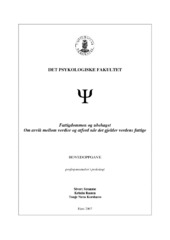| dc.contributor.author | Straume, Sivert | |
| dc.contributor.author | Rasten, Kristin | |
| dc.contributor.author | Korshavn, Tonje Næss | |
| dc.date.accessioned | 2008-08-22T10:13:43Z | |
| dc.date.available | 2008-08-22T10:13:43Z | |
| dc.date.issued | 2007 | eng |
| dc.identifier.uri | https://hdl.handle.net/1956/2759 | |
| dc.description.abstract | The present study investigated the extent to which being reminded of personally held humanistic values and one’s own effort to help the world’s poor serves to provoke cognitive dissonance. Furthermore, it investigated what consequences it might have for future behaviour, whether such dissonance is reduced through justification or self-criticism. 247 students and activists (60.7 % women; mean age 23.4 years) participated in a survey-based experiment, adapted from Elliot Aronson’s Hypocrisy paradigm. Contrary to the hypothesis, there were no differences between conditions on relevant variables. The results indicate that merely reminding people of their humanistic values and helping effort may be insufficient to make them change their thinking and behaviour on this issue. | en_US |
| dc.language.iso | nob | eng |
| dc.publisher | The University of Bergen | eng |
| dc.title | Fattigdommen og ubehaget Om avvik mellom verdier og atferd når det gjelder verdens fattige | nob |
| dc.type | Master thesis | |
| dc.rights.holder | Copyright the author. All rights reserved | |
| dc.rights.holder | The author | eng |
| dc.description.localcode | PSYK300 | |
| dc.description.localcode | PRPSYK | |
| dc.subject.nsi | VDP::Samfunnsvitenskap: 200::Psykologi: 260 | nob |
| fs.subjectcode | PSYK300 | |
